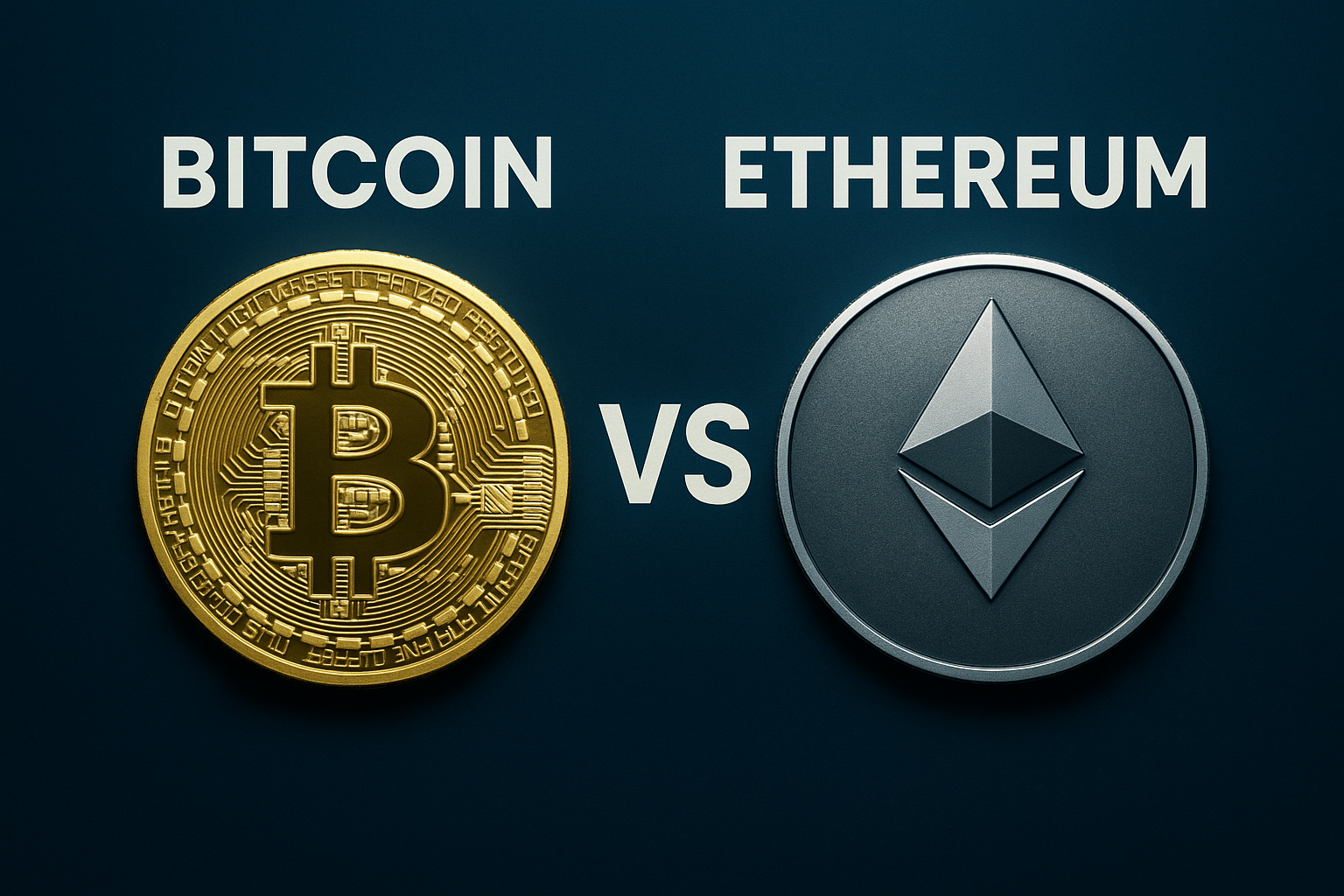Curious about Bitcoin vs. Ethereum? Discover the key differences between these two leading cryptocurrencies, from purpose and technology to use cases and future potential.
Introduction: The Titans of Crypto
Bitcoin and Ethereum are the two largest cryptocurrencies by market cap, and often dominate headlines in the crypto world. While both are decentralized digital assets, they serve very different purposes and are built on unique technologies.
So, what’s the real difference between Bitcoin vs. Ethereum? Let’s break it down.
1. Origins and Purpose Bitcoin: Digital Gold
- Launched: 2009
- Created by: Satoshi Nakamoto (pseudonym)
- Primary Use: Store of value, digital alternative to fiat currency
- Goal: Decentralize money and provide an alternative to traditional banking
Bitcoin was designed as a peer-to-peer payment system. Its capped supply of 21 million coins gives it a scarcity similar to gold, earning it the nickname “digital gold.”
Ethereum: The Programmable Blockchain
- Launched: 2015
- Created by: Vitalik Buterin and team
- Primary Use: Smart contracts and decentralized applications (dApps)
- Goal: Be the world’s decentralized computer
Ethereum was built to do much more than just send and receive currency—it allows developers to build decentralized apps, making it a cornerstone of the DeFi and NFT ecosystems.
2. Technology & Blockchain Architecture
| Feature | Bitcoin | Ethereum |
|---|---|---|
| Consensus | Proof of Work (PoW) | Proof of Stake (PoS) (Post-Merge) |
| Block Time | ~10 minutes | ~12 seconds |
| Supply Cap | 21 million BTC | No fixed cap |
| Programming | Script-based, limited | Turing-complete (Solidity) |
Ethereum Merge Update
In 2022, Ethereum transitioned from Proof of Work to Proof of Stake, significantly reducing its energy consumption and increasing scalability.
3. Use Cases Bitcoin Use Cases
- Store of value
- Hedge against inflation
- Peer-to-peer payments
- Cross-border remittances
Ethereum Use Cases
- Smart contracts
- Decentralized finance (DeFi)
- Non-Fungible Tokens (NFTs)
- Decentralized Autonomous Organizations (DAOs)
- Web3 infrastructure
4. Transaction Speed and Costs
| Metric | Bitcoin | Ethereum (Post-2.0) |
|---|---|---|
| Speed | ~7 TPS | ~30 TPS (up to 100K TPS with L2) |
| Avg Fee | $1–$5 (varies) | $0.01–$3 (with Layer 2 scaling) |
Ethereum is generally faster, especially with Layer 2 solutions like Arbitrum and Optimism, which drastically lower fees and improve throughput.
5. Community & Development Ecosystem
- Bitcoin: Strong, security-focused community; slower innovation pace due to conservatism and security concerns.
- Ethereum: Developer-rich ecosystem; fast-paced innovation in DeFi, NFTs, DAOs, and Web3.
Notable Projects on Ethereum:
- Uniswap (DEX)
- OpenSea (NFTs)
- Aave (Lending)
- Chainlink (Oracles)
6. Investment Perspective Bitcoin
- Seen as a long-term store of value
- Often compared to digital gold
- Lower volatility relative to altcoins
Ethereum
- Offers higher potential upside
- More speculative and dynamic
- Used in countless applications beyond simple payments
7. Environmental Impact
- Bitcoin (PoW): Energy-intensive mining, often criticized for environmental impact
- Ethereum (PoS): Now uses ~99.95% less energy post-Merge
Conclusion: Which Is Better – Bitcoin or Ethereum?
It depends on your goals:
| Want a secure store of value? | → Choose Bitcoin |
| Want to build or invest in DeFi/NFTs? | → Choose Ethereum |
Both are integral to the crypto ecosystem—but they solve different problems.
FAQs
Q: Can you mine Ethereum now?
A: No. After Ethereum’s transition to Proof of Stake in 2022, mining is no longer possible. You now stake ETH to validate the network.
Q: Will Ethereum ever flip Bitcoin?
A: This “Flippening” is a popular theory. Ethereum has more utility, but Bitcoin still dominates in institutional and store-of-value narratives.
Q: Can I invest in both?
A: Absolutely. Many investors diversify between BTC and ETH to balance risk and opportunity.












































